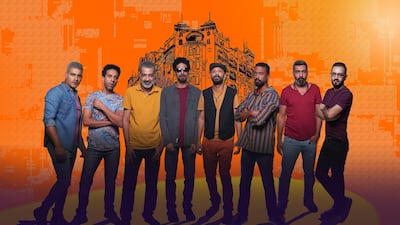If you have ever spent time in Cairo, you will be familiar with the important role coffee shops play in the Egyptian capital. Not only are they places to unwind among the hustle and bustle, they have been meeting spots for generations of Egyptians, who use them to debate and discuss the issues that matter when living in one of the most tempestuous and exciting cities in the world.
That energy has proven to be a gold mine for plenty of the country's great creatives over the years. The Egyptian coffee shop played a recurring role in the life of novelist Naguib Mahfouz both on and off the page. He was known to spend time writing in Cairo's El Fishawi coffee shop, now a tourist spot for literature lovers.
Wust El Balad have channelled that inspiration for the past two decades. Named after a downtown district of Cairo, the pioneering Egyptian group – who will perform at Abu Dhabi Cultural Foundation on Saturday – have released four albums' worth of songs that were mostly borne out of conversations held in these establishments. Married to various music styles, including rock, the blues and reggae, their songs have touched a nerve with legions of fans for their honesty, wit and clear-eyed takes on social issues affecting young Egyptians.
"A lot of the songs come from these talks," says singer and actor Hany Adel. "Sometimes it can be a case of 'I have something in my mind' and we hash it out with the group. At other times, it is from us catching up."
Accordionist Wael El Sayed agrees. He says the group’s coffee shop catch-ups are open and inclusive.
“It’s not just the band who come,” he says. “Our friends join us – and colleagues who are also in the arts, such as other poets and musicians. It is always great to share ideas and talk about what we are facing.”
The end results are albums that serve to chronicle Egyptian youth culture. The latest release, last year's Bantalony Al Jeanz (My Jeans), is mostly concerned with the persuasive role that technology plays in day-to-day life.
A stand-out track is Selfie. Powered by robotic keyboard bleeps and jerky guitar riffs, Adel plays the role of narrator as he details the life of a character who is more interested in the online world than real life.
"And we know people like that and we do that," he says. "It's about someone who spends so much time portraying the perfect life online, when in reality it has caused her loneliness and depression. This is something that a lot of us talk about, and how we spend so much time on our phones. The fans connected with this, particularly when we play it in concerts." The group discussed the topic from another angle in the charming disco number Shasha El Telephone (Telephone Screen).
“How much of our conversations are even real?” says El Sayed. “This song really questions that and it’s about we often prefer to hide behind our screens than communicate in person.”
That ability to exchange ideas freely has been the key to Wust El Balad's longevity. Last year the group celebrated their 20th anniversary with a sold-out performance at Cairo Jazz Club. El Sayed credits the group's personal relationships as being the basis of their survival.
“First and foremost, we are just good friends and that’s where it all springs from,” he says. “There is a sense of comfort that I feel with this group that I couldn’t find anywhere else, and that helps with the creativity.”
A musical prodigy and acclaimed songwriter in his own right, El Sayed, who is visually impaired, joined the band in 2012. He recalls being the odd one out in more ways than one. In addition to entering an already tight band, he remains the only member who hails from outside of Cairo, from the coastal city of Alexandria.
He laughs and agrees with the notion that the cities are notorious rivals. But in the case of Wust El Balad, he believes his inclusion has helped to steady the ship, so to speak.
"Well, Cairo is a big city and people are more direct because of that," he explains. "And people like me who come from Alexandria are more chilled and calmer about the way we go about things – that's because we have the ocean – so I would like to think that I bring those easygoing vibes to the group."
Besides, if there any disagreements, the boys will patch it up in the nearest coffee shop, where more songs shall be written.
Wust El Balad perform at the Cultural Foundation, Qasr Al Hosn, Abu Dhabi, on Saturday, October 5 at 8pm. Tickets from Dh78.50 are at wustelbalad.platinumlist.net, more information is at www.culturalfoundation.ae


